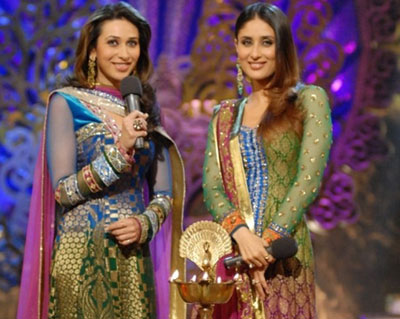
Mumbai, August 27: If her fans are eagerly waiting for Kareena Kapoor`s marriage, Karisma Kapoor is equally excited about her sister`s wedding, set to take place some time this year.
Asked about Saif Ali Khan and Kareena`s wedding dates, Karisma said: "I feel you should ask this to Kareena. She will get busy with the promotions of `Heroine` soon, so you all can catch hold of her.
"All I can say is, of course, I am excited and it will be wonderful. Even I can`t wait for Kareena`s wedding any more," Karisma told IANS.
One of the most successful actresses of the 1990s, Karisma is known for hits like ‘Hero No. 1’, ‘Biwi No. 1’, ‘Raja Hindustani’ and ‘Dil To Pagal Hai’.
She has given power packed performances in off beat films such as ‘Zubeidaa’ and ‘Fiza’.
After tying the knot with Delhi businessman Sanjay Kapur in 2003, she took a break from arc lights and grease paint to start a family.
A mother of two (daughter Samaira, born in 2005, and two-year-old son Kiaan), she made a comeback on big screen with Vikram Bhatt`s ‘Dangerous Ishq’ after five years.
But the film failed to click at the box office.
Asked about her next move, Karisma said: "Now I am reading scripts and I am going to take a little bit of break. Hopefully, next year I will do a movie but it all depends... I never really plan anything..."
Even at 38, she exudes the same charm that she used to as a top notch actress and wows everyone with her immaculate dressing sense. Karisma says her style mantra is just being comfortable.
"I always dress up for myself. I love to be myself and that has always stood out. No matter whatever the latest trend or fashion might be, I should feel comfortable with whatever I am wearing.
"So my fashion statement is to be comfortable and dress up for myself," she said adding that her two children contribute to her healthy lifestyle.
"I enjoy being a mom and I enjoy running behind my kids. My kids keep me on my toes and of course, I always endorse a healthy lifestyle."





Comments
Add new comment